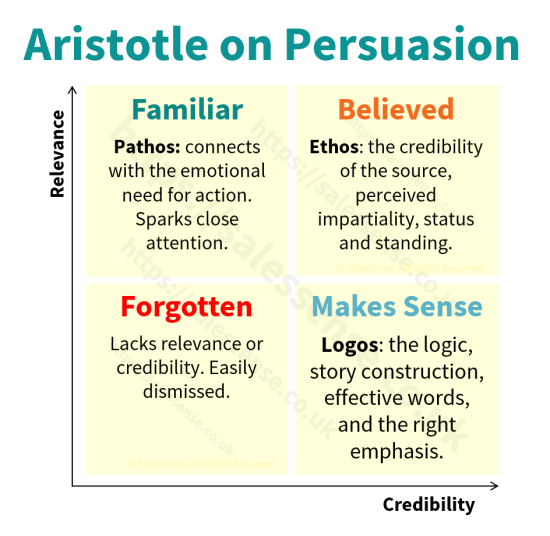The old sales principles are the building blocks of the new.

There seems to be much disdain amongst the young for the sales principles relied on by the old. Being fairly long in the tooth yet still eager to make a difference, I felt I had to resist propagation of the idea, that what has gone before is no use anymore.
Everything we have is built on top of what has already been achieved.
To quote a very old source, "If I have seen further than other men it is because I stand on the shoulders of giants". Perhaps you recognised the words of Isaac Newton whose shoulders Einstein stood on.
Setting old sales principles in a modern context seems appropriate:
- People buy on emotion
- Persuasion rests on Pathos, Ethos, and Logos
- It's a numbers game
- You have two ears and one mouth
- Proper preparation prevents particularly poor performance
- Doing things right is a waste of time unless you first choose the right things to do.
People Buy on Emotion
Or put another way, feelings dictate decisions. Neuroscience progresses at a blistering pace. If you want to look for scientific evidence indicating that we make decisions before we are consciously aware of our choices, it is easy to find. Increasingly, consciousness is seen by scientists as an emergent property of the myriad of independent loosely collaborating biological systems that our thinking selves rest on.
Does this mean that the relationship sellers are right? That might be a big assumption. When the stakes are high, do you buy from your friends or those who are most likely to deliver the desired results? The Challenger Sale presented some recent research that identified the overarching strategies adopted by salespeople. You may well recognise the types from the labels:
- Lone Wolf
- Hard Worker
- Relationship Builder
- Reactive Problem Solver
- The Challenger
The book acknowledges that all the strategies can yield high performance however, according to the CEB's extensive research, those with a challenger approach are by far the most likely to be high performers. You don't have to read the whole book. There is a free summary here.
Buying decisions are based on a connection with the emotional need for action. This is one of the old sales principles that continues to be validated by new scientific studies.
Pathos, Ethos, and Logos

Aristotle said if you want to persuade, you need three things - Pathos (connection with the emotional need), Ethos (credibility), and Logos (logic).
if you accept the analysis in Simon Sinek's Ted Talk about the Golden Circle, Aristotle had it right. Pathos - having 'belief alignment' comes first.
Then the importance of credibility - Ethos. One translation is 'divine word incarnate'. In this context, it means the source of the information being used to position the solution must be credible. It must be accepted as true.
Finally, we get to the logic - Logos. People use logic to post-justify what they have already decided to do.
In a socially connected world, these three mainstays of influence remain fundamental sales principles.
It's a Numbers Game
It doesn't matter how inept you are, if you make enough attempts you will earn some success! Consider Eddy the Eagle.
I am reminded of an old story from the days when salespeople used to literally bang on doors. A group of newly recruited green insurance salespeople were instructed to bang on doors all day and if the door was opened they had to say, "You don't want any life insurance today do you?".
On average, at every 70th door, someone said, "Yes we do, come in".
Why is it that today, decades after the email revolution began, people are still sending unsolicited sales messages? The answer has to be that it works often enough to be worthwhile!
Certainly, there is much that salespeople can do to improve the odds providing that it doesn't lead to too few attempts.
Very few salespeople enjoy prospecting - contacting potential sales prospects and trying to engage them in a business conversation. It is too easy for the preparation to become an excuse for not making the necessary attempts.
As Tom Peters put it, "fail forward faster". If you need more success, you will have to tolerate more failures.
With today's extended networks and potential reach, sales principles like this are more relevant now than ever.
You Have Two Ears and One Mouth
To conclude this sales principle or adage, "You have two ears and one mouth, use them in that proportion".
Just as almost all drivers think their driving skills are better than average, all salespeople think that their questioning and listening skills are better than average. This cannot be true. It may seem basic to work on one's questioning and listening skills yet mastering the basics is the route to excellence. Ask any sports coach.
So many interactions take place online these days that one might be forgiven for thinking that old-fashioned listening is not as important as it used to be. If anything, it presents the greater challenge of having to listen, demonstrate understanding, and communicate empathy via 140 characters.
Writing a thesis for a university degree course seems to be about finding enough words. Writing well is about communicating effectively in fewer words. Communicating integrity, building trust, encouraging sharing, paying closer attention to the words penned by others, and conveying empathy in a few phrases - these social media communication skills map directly to good listening skills.
Telling is not selling. Attentive listening is more persuasive than speaking. Sales principles like this remain as potent today as they ever were.
Proper Preparation Prevents Particularly Poor Performance
Everyone nods in agreement when I utter sales principles like this yet the most common undoing of all sales efforts is failure to prepare.
Worse still, if you don't prepare adequately, you are foregoing your opportunity to exercise free will.
I haven't the space to explain and justify this statement here. Read my article, Vanishing Free Will, if this doesn't ring true to you.
Now that everyone can check the facts you spout while you are speaking, preparation has become more important than ever. Those who turn up and pitch superlatives risk exposing themselves to ridicule.
The only way to convey more professionalism than your competitors is to carry out more forethought, planning, and preparation than they will. This is among the oldest of sales principles.
Yes, it takes more time. So choosing what to do is more critical than ever.
Doing Things Right is a Waste of Time Unless You First Choose the Right Things to Do
It is completely natural for salespeople to have total certainty that their instincts are right and that they are putting first things first. This is a downside of having a generous helping of self-confidence.
If you are among those with just a bit too much self-belief, develop a coach or mentor relationship with someone willing to challenge your assumptions and whose contrariness and scepticism you can appreciate.
If you suffer from just a little too much self-doubt, do the same. Find someone whom you trust, of whom you can ask dumb questions without being made to feel small and without worrying about confidentiality.
The large majority of all people-made disasters are the result of people doing the wrong things right. If you have done the wrong things, the time is gone and cannot be recovered. The only option is to start over. It is like almost arriving at your destination and then realising that you have left the tickets at home and will have to drive all the way back.
All for the sake of just a little more forethought, planning, and preparation.
We are surely in a new world where our opportunities are expanding faster than they ever have, yet building on the old sales principles rather than discarding them, is the surest path to future prosperity.
Article by Clive Miller
If you need to leverage sales principles, improve the quality of thinking, increase forethought, do more sales planning, or carry out more preparation, we can help. Telephone +44 (0)1392 851500. We will be pleased to discuss your needs or talk through some options. Alternatively, Send an email to custserv@salessense.co.uk for a prompt reply or use the contact form here.













